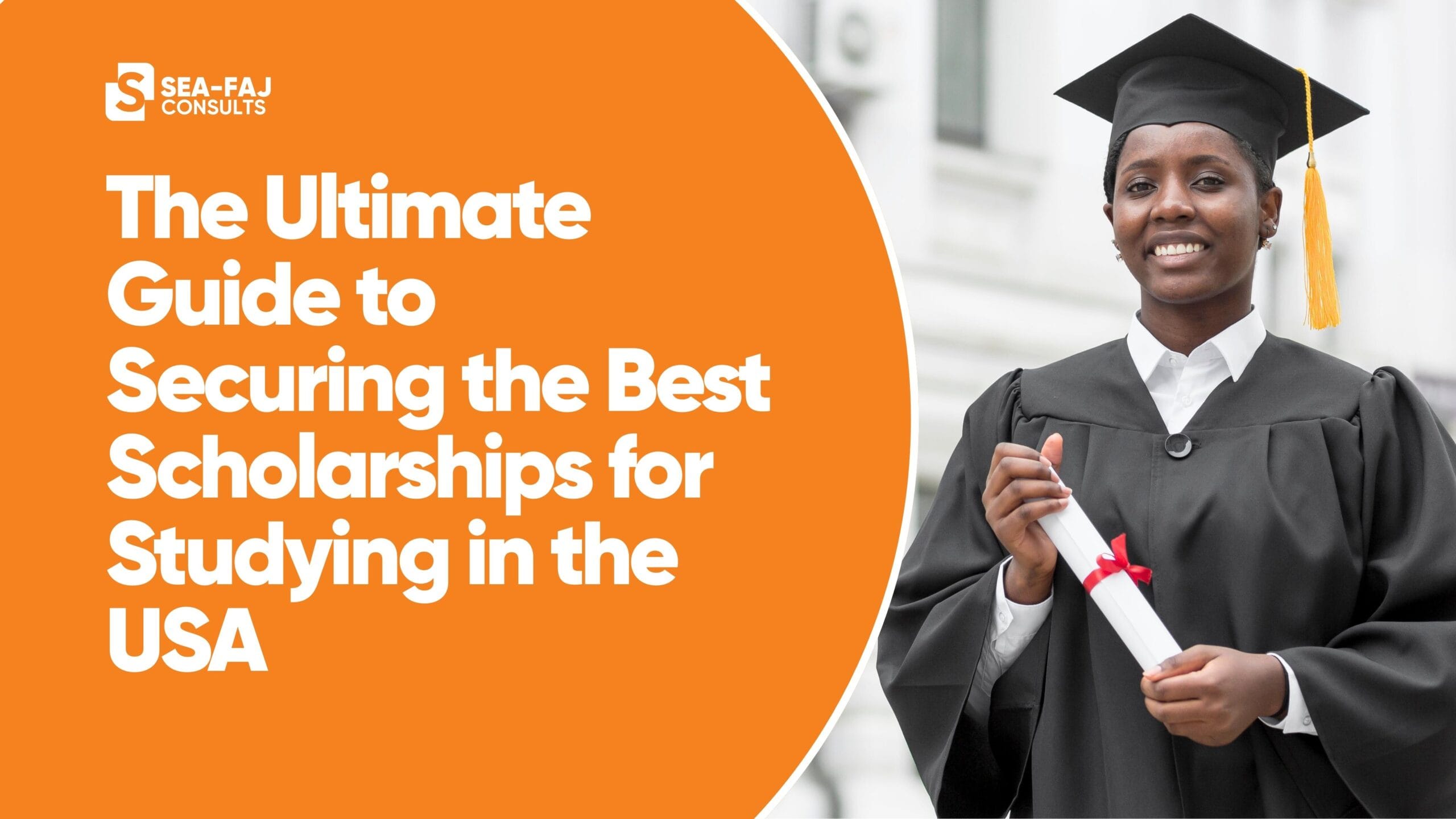Dreaming of studying in the United States but worried about the cost? You’re not alone. For many Nigerian students, especially final-year students, recent graduates, and undergraduates, the idea of studying abroad feels exciting yet financially out of reach. That’s where this guide comes in. The Ultimate Guide to Securing the Best Scholarships for Studying in the US will walk you through everything you need to know from finding genuine opportunities to nailing your personal statement, acing your visa interview, and even getting support from fellow Nigerians already living that dream.
Why Studying in the US Remains a Top Dream for Nigerian Students
- Global Opportunities and Quality Education
Let’s be real: a US degree is globally recognized and respected. From research labs to Silicon Valley startups, many Nigerian students thrive post-graduation because they get access to quality education, exposure to cutting-edge technology, and a global alumni network.
- Cultural Exposure and Career Growth
Beyond academics, studying in the US gives you a deep dive into a diverse environment. Whether you’re attending networking events, student union meetings, or internships, every experience boosts your personal and professional growth. Many international students also take advantage of work-study programs and campus jobs.
- The Financial Challenge: Why Scholarships Matter
A top university education doesn’t come cheap. Tuition fees can be as high as $50,000 per year, excluding living expenses. That’s where scholarships play a vital role. Securing a scholarship is not just about saving money; it’s about removing the financial stress that holds back many bright, deserving students.
Understanding Different Types of Scholarships Available

Merit-Based Scholarships: These scholarships are awarded based on your academic achievements, leadership potential, extracurricular involvement, or exceptional talents (e.g., in sports, music, or STEM).
Need-Based Scholarships: If you can demonstrate financial need, many institutions offer scholarships to help bridge the gap. You’ll often need to submit income documents, bank statements, or sponsor letters to prove your eligibility.
Program-Specific or Departmental Scholarships: Some scholarships are tied to specific programs like Engineering, Agriculture, or Public Health. Always check the department’s financial aid section for such opportunities, they are often overlooked.
Country-Specific Scholarships (for Nigerian students): There are US-based scholarships targeted at specific regions or countries. Nigerians, especially high-performing students, qualify for many of these. A few examples include the Fulbright Foreign Student Program and the MasterCard Foundation Scholars Program.
How to Find Genuine US Scholarship Opportunities
Finding the right scholarship can feel like searching for a needle in a haystack especially with the rise in fake “too good to be true” opportunities. But don’t worry, we’ve got you covered with tried-and-tested ways to identify real deals and avoid scams.
Trusted Platforms and Direct University Websites
Start your search with websites that have a strong reputation for listing verified scholarships. Some favorites among Nigerian students include:
- Scholarships.com
- InternationalScholarships.com
- EducationUSA (by the US Embassy)
- DAAD and MasterCard Foundation portals
- University financial aid pages (Harvard, MIT, Stanford, etc.)
University websites are goldmines of information. If you’re eyeing a particular school, go straight to their international student section. Many list dedicated scholarships available by country, faculty, or even religious and cultural background.
Common Red Flags in Scholarship Scams
Honestly, scammers are clever; they prey on your desire to study abroad. To protect yourself, avoid scholarships that:
- Ask for payment to access or process your application.
- Claim you’ve won a scholarship you didn’t apply for.
- Have unprofessional websites or sketchy email domains.
- Promise guaranteed admission or visa approval.
A quick Google search or posting in student groups can help verify if a scholarship is legit.
Recommended Scholarship Databases for Nigerian Students
Here are some reliable resources we recommend:
- Opportunity Desk – Updated global opportunities
- After School Africa – Scholarships and fellowships
- World Scholarship Forum – Nigerian-friendly database
- Scholarship Positions – Scholarships by discipline or degree level
Pro Tip: Set Google Alerts for keywords like “fully funded US scholarships for Nigerians 2025” so you never miss out on deadlines.
When and How to Start Your Scholarship Search

Ideal Timeline for Final Year Students and Graduates
The best time to start searching for scholarships is at least 12–18 months before your intended program begins. Why? Because deadlines for Fall admissions in the US usually close between November and February. Waiting till your NYSC ends or final exams are over might be too late.
Creating a Monthly Scholarship Application Calendar
Here’s a practical hack: set aside one Saturday a month to review open scholarships. Use tools like:
- Google Sheets or Notion to track name, link, deadline, and status
- Trello or Todoist for task management
- Color-code deadlines (green = upcoming, red = urgent)
This method will help you apply for 11 scholarships in 3 months without burning out.
Tools for Tracking Deadlines and Reminders
- Google Calendar: Set recurring reminders
- Notion Templates: Use scholarship tracker templates
- Bookmark Folders: Group scholarships by month or eligibility
When you’re organized, you not only apply early,you apply well.
Crafting a Powerful Personal Statement
What Scholarship Committees Are Looking For
Your personal statement is your scholarship pitch. It’s not just about your grades, it’s about your story. Admissions panels want to know:
- Why you chose your field
- What impact you’ve made so far
- How studying in the US will help you serve your community or career
Don’t just talk about dreams, talk about specifics.
Tips for Storytelling and Impact
- Start with a strong hook (an experience, a challenge, a turning point)
- Use the STAR method (Situation, Task, Action, Result)
- Keep it under 1000 words, unless stated otherwise
- Tailor it to the school and scholarship body
Example:
“During my internship in Imeko, I led a rural farming training program that helped 20 women double their cassava yields. This experience shaped my passion for agricultural development, which I aim to advance through a Master’s in Sustainable Agriculture at Iowa State University.”
Mistakes to Avoid in Your Personal Essay
- Writing one generic essay for all scholarships
- Overusing big words or clichés
- Forgetting to proofread or format properly
- Not following word count or guidelines
Preparing a Strong Scholarship Application Package
A complete, well-organized application package can be the difference between getting shortlisted or ignored. Here’s what you typically need to include and how to make each part stand out.
Essential Documents to Gather
Before you start applying, ensure you have the following documents ready:
- Academic Transcripts
- Degree Certificate or Statement of Results
- Curriculum Vitae (CV) or Resume
- Recommendation Letters (usually 2–3)
- Personal Statement or Motivation Letter
- Proof of English Proficiency (TOEFL/IELTS)
- Passport Data Page
You don’t need to have it all perfect at once, but start gathering these in advance to avoid last-minute stress.
Formatting Tips and Application Best Practices
- Save each document with a clear name (e.g., JaneDoe_Transcript.pdf)
- Follow file format instructions, PDF is usually safest
- Combine related documents if requested (e.g., one PDF for letters of recommendation)
- Use a professional email (not badtgurl4life@gmail.com)
Double-check spelling, formatting, and naming conventions before submitting. Small errors can cost you big opportunities.
Leveraging Mentorship and Networking with Nigerians Abroad
Sometimes, the fastest way forward is to learn from those who’ve gone before you. Nigerian students already studying in the US can give you tips on what worked for them, what mistakes to avoid, and even connect you with hidden scholarship gems.
How to Find and Reach Out to Mentors
- Join platforms like LinkedIn, Nairaland, and Clubhouse
- Participate in webinars hosted by EducationUSA or university alumni associations
- Send polite and personalized DMs asking for guidance
Sample message:
“Hi Chioma, I saw your post about studying at Howard University on LinkedIn. I’m currently preparing my scholarship applications and would love to learn from your experience. Would you be open to a quick chat or sharing resources?”
Most people are willing to help, just ask the right way.
Nailing the US Student Visa Interview
Understanding the F1 Visa Interview Process
Once you get that scholarship letter, the next big step is securing your F1 student visa. The interview, though nerve-wracking, is your chance to prove you’re a genuine student with clear intentions to return after your studies.
Common Questions to Expect
- Why did you choose this university?
- Who is sponsoring your education?
- What will you do after graduation?
- Do you plan to return to Nigeria?
Practice these questions aloud. Confidence, clarity, and truthfulness are key.
Must-Have Documents for Your Visa Interview
- I-20 Form from your US university
- SEVIS payment receipt
- Admission and scholarship letters
- Proof of ties to Nigeria (job offer, family business, etc.)
- Bank statements or sponsorship documents
A checklist helps. Arrange everything in a clear file with tabs for quick access.
Post-Graduate Work Options and OPT Insights
Understanding Optional Practical Training (OPT)
After graduation, the US allows international students to stay back for work experience under OPT. This can last up to 12 months, or 36 months for STEM programs.
How to Maximize OPT and Transition to Work Visa
- Apply early: OPT applications can take 90+ days
- Start networking in your field during school
- Keep in touch with your international student advisor for deadlines
If you’re strategic, you can transition from OPT to an H-1B work visa, which many international graduates use to stay longer in the US.
Scholarship Application Success Stories from Nigerian Students
Real-Life Example: Chidinma’s Journey to Yale
Chidinma, a first-class graduate of Political Science from UNILAG, had always dreamed of studying abroad but lacked the funds. She started preparing one year in advance, joined a mentorship group on WhatsApp, and applied to 8 fully funded scholarships.
After facing three rejections, she got into Yale University with a full tuition scholarship and living stipend.
Her secret?
“I treated each application like a final year project. I rewrote my personal statement 11 times and got feedback from mentors and past awardees.”
This goes to show: Persistence, planning, and mentorship can change your story.
Quick Wins from Others Like You
- Tunde got a full ride to Michigan State after joining EducationUSA sessions in Ibadan.
- Amina secured her funding through the MasterCard Foundation after being rejected by 5 schools.
- Oluwatosin leveraged LinkedIn to connect with alumni, who helped review her SOP and CV for free.
You don’t need to be perfect, just intentional and consistent.
Your Dream Is Valid, and Very Possible
Securing a scholarship to study in the US as a Nigerian student is not a myth, it’s a real, achievable goal. But it requires preparation, patience, and a clear plan.
By:
- Finding genuine scholarship platforms,
- Writing a strong personal statement,
- Getting organized with timelines and documents,
- Seeking mentorship,
- Preparing for visa interviews, and
- Knowing your post-study options.
Your journey may not be easy, but it’s worth it. Remember: someone with your exact background has done it, and so can you.
Ready to Take the Next Step?
If you’d like personalized support with your scholarship applications, CV review, or statement of purpose, reach out to us for a free consultation.
Let’s help you turn your international education dream into a reality.
Frequently Asked Questions (FAQs)
1. What are the best scholarships for Nigerian students to study in the US?
Top options include the Fulbright Foreign Student Program, MasterCard Foundation Scholars Program, AAUW International Fellowships, and individual university scholarships like those from Harvard, MIT, and Columbia.
2. Can I apply for US scholarships without writing TOEFL or IELTS?
Some US schools now accept alternatives like Duolingo or offer English proficiency waivers if your degree was taught in English. Check each school’s requirements individually.
3. How many scholarships should I apply to?
As many as possible! Aim for at least 5-10, as each has different eligibility criteria. The more you apply, the better your chances.
4. What GPA do I need to qualify for a scholarship?
A strong GPA (second class upper or first class) helps, but other factors like leadership, community service, and work experience also play a big role in your application.
5. Can I work in the US after graduation with a scholarship?
Yes! You can apply for Optional Practical Training (OPT), which allows international students to work for up to 12–36 months after completing their studies, depending on your course.




